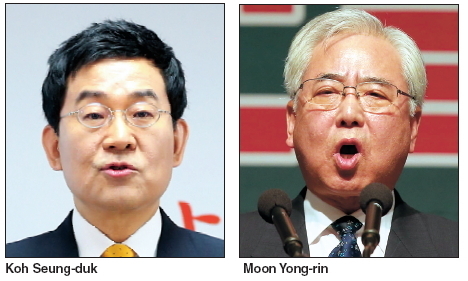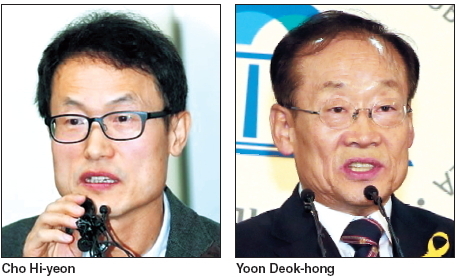Gloves are off in education chief election
Candidates exchange accusations, tough words in a bid to land Seoul’s top education job
By Yoon Min-sikPublished : May 15, 2014 - 20:56
As the June 4 local elections draw near, those in education circles are focusing on who will head the Seoul Metropolitan Office of Education.
On Thursday, local dailies revealed the approval ratings for major candidates vying for the education chief job of the nation’s capital and biggest city. While the numbers varied, all of them had conservative candidates comfortably leading their liberal counterparts.
But unlike in the past, when prominent figures from each side joined forces to win the election, the candidates seem determined to gnaw on the necks of those from the same bloc.

Koh Seung-duk, a former Saenuri lawmaker and the most popular candidate as of Thursday, recently opened fire at incumbent education chief Moon Yong-rin, his conservative rival.
“The teachers told me the education office has not been fair in terms of (selecting beneficiaries) of policy in the past two years,” Koh said. He used the term “education mafia” to refer to a small number of people in education circles supposedly monopolizing the resources and high-ranking posts.
Koh’s kryptonite, however, is his apparent lack of experience in the education field. While his five-year tenure as an adjunct professor for local universities makes him eligible as a candidate, he spent most of his adult life as a lawyer.
“The general consensus is that the education chief should be someone who committed everything to education and has a deep understanding of the field. In education circles, Koh is a complete stranger,” said Moon, formerly a professor of education and education minister during the Kim Dae-jung administration.
The relationship between Moon and Koh, the two current leaders in terms of approval ratings, quickly turned sour during the conservative’s recent botched campaign merger attempt.
A group of conservative civic organizations in March formed a committee to elect unified candidates to run for education chief posts across the country. Although the committee selected Moon as the single candidate for Seoul, other conservatives raised issues about the fairness of the selection process. Koh said Moon should not describe himself as “the unified candidate” since it may lead the voters to think that he is the sole conservative candidate.
While the battles raged on the conservative side, campaign merger bedlam ailed the liberals as well.
In March, sociology professor Cho Hi-yeon was selected to represent the liberal faction through a primary. But more than a month after the campaign merger, former deputy education minister Yoon Deok-hong belatedly announced his candidacy for the education post, saying Cho had a small chance of winning the election.
The current law states that anyone who has been a member of a political party within one year of registering as a candidate is forbidden from running for an education chief post.
Although Yoon is still officially a member of the New Politics Alliance for Democracy, he claims that he submitted the request to leave the party on April 23, 2013. The National Election Committee said if Yoon can prove he handed in the paperwork at that time, he will be considered a nonmember of the NPAD from the cited date.
“Even if he does get elected, there is a possibility that his win may be annulled by the subsequent investigation by the prosecutors,” Cho said.
Yoon responded by urging Cho to stop what he called “blunt slandering.” He also raised allegations that opposition parties brought their members to the primary to help Cho win.
As of Thursday, the two share between 6 to 15 percent in approval ratings, with Cho having a slight advantage.
Despite the internal feuds, the candidates’ policies were generally consistent to their ideological blocs. Conservatives on the whole were favorable toward retaining elite schools like autonomous private high schools, while the liberals vowed to launch major reforms.
The two sides also clashed on the free lunch and education issues, which the conservatives blamed for the small safety-related budget.
All candidates shared common ground in safety, which emerged as the talk of the town after tragic ferry sinking in April claimed over 200 lives, most of them students.
Koh vowed to establish a separate department dealing exclusively with school safety while Moon promised to include safety education programs in the curriculum. Cho said he will enact an ordinance on safe school trips and Yoon pledged to establish a school safety committee.
Experts, however, questioned whether the seemingly rushed safety policies are plausible. Lee Kwang-jae, secretary-general of civic group Korea Manifesto Center, said none of the policies are original ideas.
“They just took the existing ideas and slapped ‘safety’ on them. There are no specific plans on carrying them out,” he said. “It’s a good thing safety is finally getting its overdue attention, but I fear it may all be just words and no action.”
By Yoon Min-sik (minsikyoon@heraldcorp.com)
On Thursday, local dailies revealed the approval ratings for major candidates vying for the education chief job of the nation’s capital and biggest city. While the numbers varied, all of them had conservative candidates comfortably leading their liberal counterparts.
But unlike in the past, when prominent figures from each side joined forces to win the election, the candidates seem determined to gnaw on the necks of those from the same bloc.


Koh Seung-duk, a former Saenuri lawmaker and the most popular candidate as of Thursday, recently opened fire at incumbent education chief Moon Yong-rin, his conservative rival.
“The teachers told me the education office has not been fair in terms of (selecting beneficiaries) of policy in the past two years,” Koh said. He used the term “education mafia” to refer to a small number of people in education circles supposedly monopolizing the resources and high-ranking posts.
Koh’s kryptonite, however, is his apparent lack of experience in the education field. While his five-year tenure as an adjunct professor for local universities makes him eligible as a candidate, he spent most of his adult life as a lawyer.
“The general consensus is that the education chief should be someone who committed everything to education and has a deep understanding of the field. In education circles, Koh is a complete stranger,” said Moon, formerly a professor of education and education minister during the Kim Dae-jung administration.
The relationship between Moon and Koh, the two current leaders in terms of approval ratings, quickly turned sour during the conservative’s recent botched campaign merger attempt.
A group of conservative civic organizations in March formed a committee to elect unified candidates to run for education chief posts across the country. Although the committee selected Moon as the single candidate for Seoul, other conservatives raised issues about the fairness of the selection process. Koh said Moon should not describe himself as “the unified candidate” since it may lead the voters to think that he is the sole conservative candidate.
While the battles raged on the conservative side, campaign merger bedlam ailed the liberals as well.
In March, sociology professor Cho Hi-yeon was selected to represent the liberal faction through a primary. But more than a month after the campaign merger, former deputy education minister Yoon Deok-hong belatedly announced his candidacy for the education post, saying Cho had a small chance of winning the election.
The current law states that anyone who has been a member of a political party within one year of registering as a candidate is forbidden from running for an education chief post.
Although Yoon is still officially a member of the New Politics Alliance for Democracy, he claims that he submitted the request to leave the party on April 23, 2013. The National Election Committee said if Yoon can prove he handed in the paperwork at that time, he will be considered a nonmember of the NPAD from the cited date.
“Even if he does get elected, there is a possibility that his win may be annulled by the subsequent investigation by the prosecutors,” Cho said.
Yoon responded by urging Cho to stop what he called “blunt slandering.” He also raised allegations that opposition parties brought their members to the primary to help Cho win.
As of Thursday, the two share between 6 to 15 percent in approval ratings, with Cho having a slight advantage.
Despite the internal feuds, the candidates’ policies were generally consistent to their ideological blocs. Conservatives on the whole were favorable toward retaining elite schools like autonomous private high schools, while the liberals vowed to launch major reforms.
The two sides also clashed on the free lunch and education issues, which the conservatives blamed for the small safety-related budget.
All candidates shared common ground in safety, which emerged as the talk of the town after tragic ferry sinking in April claimed over 200 lives, most of them students.
Koh vowed to establish a separate department dealing exclusively with school safety while Moon promised to include safety education programs in the curriculum. Cho said he will enact an ordinance on safe school trips and Yoon pledged to establish a school safety committee.
Experts, however, questioned whether the seemingly rushed safety policies are plausible. Lee Kwang-jae, secretary-general of civic group Korea Manifesto Center, said none of the policies are original ideas.
“They just took the existing ideas and slapped ‘safety’ on them. There are no specific plans on carrying them out,” he said. “It’s a good thing safety is finally getting its overdue attention, but I fear it may all be just words and no action.”
By Yoon Min-sik (minsikyoon@heraldcorp.com)




















